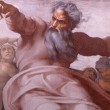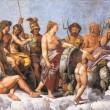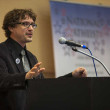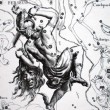God, Professors, and Evolutionary Biology Classes
by Dr. Stacy Trasancos
Filed under Christianity and Science, Evolution

Professor David P. Barash recently wrote an opinion column in the New York Times titled “God, Darwin and My College Biology Class.” Professor Barash is in the psychology department at the University of Washington. He teaches courses on sociobiology. He explained in his essay why he gives undergraduate students “The Talk.” No, it’s not about sex. The Talk is about faith and science. He says: "And that’s where The Talk comes in. It’s irresponsible to teach biology without... Read More
Does the Shroud of Turin Prove God?
by Fr. Dwight Longenecker
Filed under The Existence of God, The Resurrection

I've written here at Strange Notions in the past about miracles and skepticism, and about the greatest miracle claim of all, Jesus' resurrection from the dead. Such miracles serve as arguments for God’s existence, but not philosophical arguments based on design, prime movers, etc. They are based on physical, historical evidence. The arguments go like this: If atheistic materialism is true, then the natural world must be a closed system. Everything must be explained within that closed... Read More
How to Find God (in Six Not-So-Easy Steps)
by Jennifer Fulwiler
Filed under Belief

I regularly get emails from people who say that they've been seeking God, but haven't found him. They often express disappointment and frustration at the fact that once-promising spiritual journeys have now led to a dead end, and they want to know: "Is there anything else I can do?" I'm not a spiritual director or a theologian, but I do have plenty of experience with spiritual dry spells and difficulties in the process of conversion, and I've spent a lot of time talking with wise people... Read More
Revisiting the Argument from Motion
by Bishop Robert Barron
Filed under The Existence of God

One of the unintended but happy consequences of the emergence of the new atheism is a renewed interest in the classical arguments for God’s existence. Eager to defend the faith that is so vigorously attacked today, Catholic apologists and evangelists have been recovering these rational demonstrations of the truth of God; and the atheists, just as eager to defend their position, have entered into the fray. In the process, these ancient arguments, long thought by many to be obsolete, have... Read More
The Efficient Causality Argument for God
by Dr. Peter Kreeft
Filed under The Existence of God

All people notice that some things cause other things to be (to begin to be, to continue to be, or both). For example, a man playing the piano is causing the music that we hear. If he stops, so does the music. Now ask yourself: Are all things caused to exist by other things right now? Suppose they are. That is, suppose there is no Uncaused Being, no God. Then nothing could exist right now. For remember, on the no-God hypothesis, all things need a present cause outside of themselves in... Read More
Orwellian Analytics: Christians, Atheists, and Bad Statistics
by Dr. William M. Briggs
Filed under Christianity and Violence

A recent Live Science press release, titled “Believers Leave Punishment to Powerful God,” opened with the memorable words: "Believing in an involved, morally active God makes people less likely to punish others for rule-breaking, new research finds." Which is equivalent to saying that non-believers are less forgiving, less compassionate, less merciful, and—oh, let’s just say it: they are worse people. Don’t get mad at me. This is research! But then maybe this summary is too... Read More
Debunking the “One God Further” Objection
by Dr. Edward Feser
Filed under The Existence of God

Philosopher Bill Vallicella recently replied to what might be called the “one god further” objection to theism. Bill sums up the objection as follows: "The idea, I take it, is that all gods are on a par, and so, given that everyone is an atheist with respect to some gods, one may as well make a clean sweep and be an atheist with respect to all gods. You don't believe in Zeus or in a celestial teapot. Then why do you believe in the God of Isaac, Abraham, and Jacob?" Or as the Common... Read More
Did the Accounts of Jesus Evolve?
by Joe Heschmeyer
Filed under Historicity

Biblical skeptics often surmise that the earliest New Testament books tell a very different story than the later books: that the story of Jesus grew with time, becoming more and more incredible, and less and less historical. In other words, the New Testament evolved from history to religious mythology. Recently, I've seen this argument raised about both the Resurrection and the divinity of Christ. First, retired Episcopal Bishop John Shelby Spong (who denies the Resurrection) attacked... Read More
Richard Carrier’s Deeply Flawed Argument To Show God Is Unlikely
by Dr. William M. Briggs
Filed under The Existence of God

In the comment section to an earlier piece of mine on Strange Notions, Richard Carrier invited me to “interact” with him through his article “Neither Life nor the Universe Appears Intelligently Designed”, found in The End of Christianity, edited by John W. Loftus. This article is the “interaction” Carrier requested. I apologize for its delay. Introduction Richard Carrier’s argument to show that God probably didn’t create the universe, and therefore He probably... Read More
Science or Myth: A False Dichotomy

“Reality is everything that exists. That sounds straightforward, doesn’t it? Actually it isn’t.” Thus begins Professor Richard Dawkins’ recent book, The Magic of Reality. In order to explain reality, Professor Dawkins takes us on a tour of modern science by contrasting its explanations with those we find in myths and fables: “These are the stories we all remember with fondness from our childhood, and many of us still enjoy when served up in a traditional Christmas... Read More






